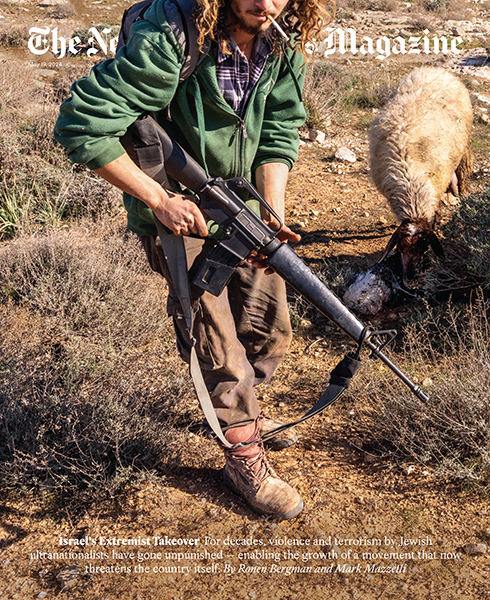2025 Hillman Prize for Magazine Journalism

Ronen Bergman and Mark Mazzetti
Beatings, murder threats, harassment, vandalism, and the torching of homes: Jewish extremists have been committing these crimes against Palestinians in the West Bank for decades, with impunity. The authorities routinely ignore their actions, and the perpetrators are unpunished. Israelis who have tried to stop them have been targeted themselves. And now the terrorists have seized power in government, which many believe has jeopardized the future of Israel.
The New York Times Magazine feature “The Unpunished” describes how a radical ideology moved from the fringes to the heart of Israeli political power. Karim Khan, chief prosecutor of the International Criminal Court, cited this investigation by reporters Ronen Bergman and Mark Mazzetti as evidence, when he announced arrest warrants on war crimes charges for Prime Minister Benjamin Netanyahu and Defense Minister Yoav Gallant.

Bergman and Mazzetti open with the story of a West Bank village of 150 people, who had been facing threats for years from Jewish settlers. In the days after the October 7 Hamas attack, occasional harassment and vandalism escalated into beatings and murder threats. The villagers begged the Israeli police and military for protection. Getting none, they fled. The village was bulldozed, and an Israeli flag planted. Stories like this have played out for decades.
“The Unpunished” draws on years of reporting, secret documents, and interviews with more than 100 people. Bergman and Mazzetti trace the arc of Israel’s ultranationalist movement, from the Gush Emunim settler movement of the 1970s, to Meir Kahane’s violent rhetoric that spawned terror groups like the Jewish Underground, to the rise of ultranationalists like Itamar Ben-Gvir, who was convicted multiple times for supporting terrorists.
In case after case, the journalists reveal the failures of Israeli authorities to investigate and prosecute crimes against Palestinians, sometimes because they feared the settlers who committed those crimes, sometimes because they supported them, and sometimes simply because they believed there was no point.
As a result, ultranationalist violence is flourishing in plain view. Local police present systemic barriers to Palestinians reporting crimes; politicians influence judges to ignore the violence; and far-right political figures pressure Israeli leaders to commute the sentences of perpetrators or grant them full pardons. Those who dare speak out about the threat to Israeli democracy, the lack of accountability, and the decay of the legal system, see their warnings buried.
After 50 years of crime without punishment, in many ways the violent settlers and the state have become one. Two are top national security officials in the Netanyahu government. One oversees the military administration of the West Bank. Shortly after he was sworn in, settlers torched hundreds of Palestinian homes in the town of Huwara. When one Israeli commander called the attack a pogrom, the pro-settler official declared: “The village of Huwara needs to be wiped out.”
The settler movement is profoundly shifting the balance of power in the Middle East, even as the United States and Israel’s other allies do little to stop it.
Ehud Olmert, the former Israeli prime minister, said he believes that many members of the ultraright in Israel “want war.” They “want intifada,” he said, “because it is the ultimate proof that there is no way of making peace with the Palestinians and there is only one way forward—to destroy them.”
“The Unpunished” exposes the complicity of Israeli institutions and a two-tiered justice system in perpetuating violence.
You have to understand why all this is important now,” one former Shin Bet chief told Bergman and Mazzetti. “We are not discussing Jewish terrorism. We are discussing the failure of Israel.”
Mark Mazzetti is a correspondent for The New York Times, where he covers national security, intelligence and foreign affairs. He is a three-time winner of the Pulitzer Prize and a five-time winner of the George Polk Award. He is the author of The Way of the Knife: the C.I.A., a Secret Army, and War at the Ends of the Earth.
Ronen Bergman is a staff writer for The New York Times Magazine, based in Tel Aviv. His latest book is Rise and Kill First: The Secret History of Israel’s Targeted Assassinations, published by Random House.

